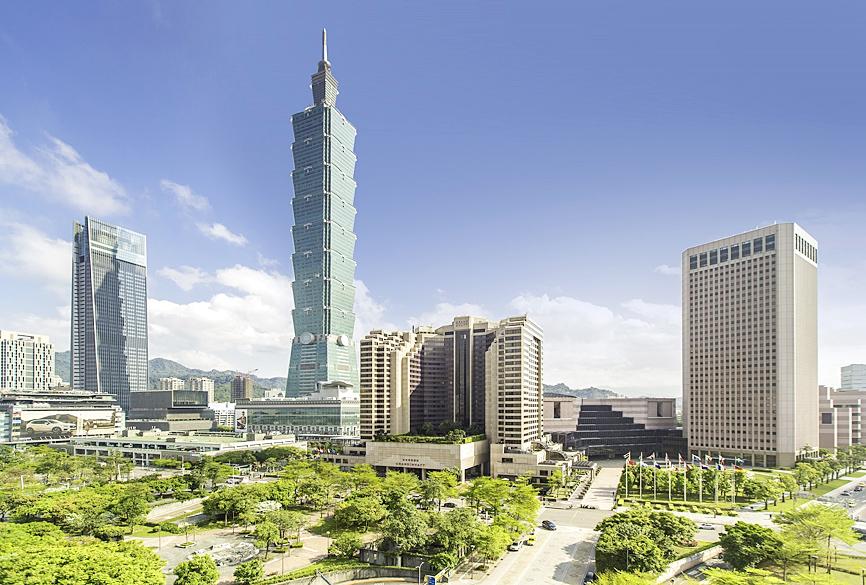Singapore-based Hong Leong Hotel Development Ltd (豐隆大飯店股份) yesterday said it has extended a management contract to ensure the continued presence of the Grand Hyatt brand in Taipei, ending rumors that the two sides were parting ways.
“We are pleased Hyatt is able to come to terms on the extension of the management contract of Grand Hyatt Taipei,” said Kwek Leng Beng (郭令明), executive chairman of City Developments Ltd (城市發展) and Millennium & Copthorne Hotels Ltd (千禧國敦酒店).
Hong Leong Hotel Development is a subsidiary of Millennium, and both fall under the Hong Leong Group (豐隆集團).

Photo courtesy of Grand Hyatt Taipei
The Grand Hyatt Taipei (台北君悅大飯店), owned and built by Hong Leong Hotel Development and affiliates, earlier sought to end cooperation with US hotel chain Hyatt Hotels Corp, which in 2018 inked a pact with private equity fund Riant Capital Ltd (子樂投資) to launch two sister brands nearby — Park Hyatt and Andaz, local media reported.
Hong Leong was reportedly worried that there would be excessive competition among similar brands.
Riant Capital now favors developing office spaces rather than hotel rooms for its upcoming Taipei Sky Tower (台北天空塔) project, which is where CTBC Financial Holding Co’s (中信金控) headquarters used to be, local media said.
Rent rates for office space have increased significantly in Taipei’s prime Xinyi District (信義), as there is no new supply, while there is solid leasing demand from international technology and financial companies, property analysts have said.
Grand Hyatt Taipei, which turns 30 next month, was the nation’s first international hotel brand and remains the largest by number of rooms at 850.
Hong Leong has committed to the local government and community by investing in the hotel’s staff and its physical assets, as evidenced by its renovation of facilities, Kwek said.
“Grand Hyatt Taipei has become an icon and we are confident it will continue to shine and serve local and international guests well,” he said.
Situated near Taipei 101, the hotel has witnessed the growth and prosperity of Xinyi as it has evolved into a central business district in Taiwan and the region, he added.
David Udell, Hyatt’s group president for the Asia-Pacific, said that the Grand Hyatt brand aims to offer captivating and theatrical experiences for all guests.
“We are grateful for our partnership with Hong Leong and look forward to continuing to bring the Grand Hyatt experience to local and international guests for many more years to come,” Udell said.
The hotel would continue to be a preferred venue for hosting large-scale events and weddings, Udell said, adding that the facility is also famed for its award-winning dining outlets.

Intel Corp chief executive officer Lip-Bu Tan (陳立武) is expected to meet with Taiwanese suppliers next month in conjunction with the opening of the Computex Taipei trade show, supply chain sources said on Monday. The visit, the first for Tan to Taiwan since assuming his new post last month, would be aimed at enhancing Intel’s ties with suppliers in Taiwan as he attempts to help turn around the struggling US chipmaker, the sources said. Tan is to hold a banquet to celebrate Intel’s 40-year presence in Taiwan before Computex opens on May 20 and invite dozens of Taiwanese suppliers to exchange views

Application-specific integrated circuit designer Faraday Technology Corp (智原) yesterday said that although revenue this quarter would decline 30 percent from last quarter, it retained its full-year forecast of revenue growth of 100 percent. The company attributed the quarterly drop to a slowdown in customers’ production of chips using Faraday’s advanced packaging technology. The company is still confident about its revenue growth this year, given its strong “design-win” — or the projects it won to help customers design their chips, Faraday president Steve Wang (王國雍) told an online earnings conference. “The design-win this year is better than we expected. We believe we will win

Chizuko Kimura has become the first female sushi chef in the world to win a Michelin star, fulfilling a promise she made to her dying husband to continue his legacy. The 54-year-old Japanese chef regained the Michelin star her late husband, Shunei Kimura, won three years ago for their Sushi Shunei restaurant in Paris. For Shunei Kimura, the star was a dream come true. However, the joy was short-lived. He died from cancer just three months later in June 2022. He was 65. The following year, the restaurant in the heart of Montmartre lost its star rating. Chizuko Kimura insisted that the new star is still down

While China’s leaders use their economic and political might to fight US President Donald Trump’s trade war “to the end,” its army of social media soldiers are embarking on a more humorous campaign online. Trump’s tariff blitz has seen Washington and Beijing impose eye-watering duties on imports from the other, fanning a standoff between the economic superpowers that has sparked global recession fears and sent markets into a tailspin. Trump says his policy is a response to years of being “ripped off” by other countries and aims to bring manufacturing to the US, forcing companies to employ US workers. However, China’s online warriors